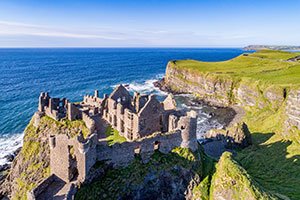The drawbridges are down. The silver is polished. The tea is brewing. One lump or two? How about five?! Showing you the sweet sights of five captivating countries over 24 days, our most in-depth tour of Britain and Ireland truly pours on the charm. Royals and writers, artists and architects, real-life warriors and fictional spies - you’ll walk in the footsteps of them all throughout the legendary cities, seaside villages, and quaint countryside hamlets of England, Wales, Ireland, Northern Ireland, and Scotland. Coast to coast, castle to castle, and pub to pub, you’ll drink in the classic landmarks and landscapes, the famous rivers and ruins, the breathtaking islands and Highlands, and the celebrated stories behind them all. From Abbey Road to Penny Lane and Stonehenge to Clava Cairns, this is the rock star of all Britain and Ireland vacations.
Stratford-on-Avon
Stratford-on-Avon
Set in the beautiful rural Warwickshire countryside, on the banks of the river Avon, Stratford is one of the most important tourist destinations in England. Using Stratford as a base, you can enjoy the delights not only of Shakespeare's hometown, but also the nearby surrounding shire counties of Oxfordshire, Worcestershire and Gloucestershire.
|
Destination Guide
|
York
York
Explore 2000 years of history in the street, buildings and museums that chronicle York's outstanding beauty and vibrant heritage. Witness the beauty of Yorkshire with ease. The city's night clubs, themed pubs and restaurant offer a variety of activities and York has major events for cultural events and conferences. Visit the famous York Minster, award-winning Jorvik Viking Centre, National Railway Museum, Yorkshire Museum and Castle Museum. York offers a unique shopping experience and a lesson in history. Shop Victorian in Swinegate Walk and be entertained by street performers in Coppergate.
|
Destination Guide
|
Liverpool
Liverpool
Liverpool – just saying the name automatically brings the world’s most famous group to mind – The Beatles. Liverpool however has more to offer visitors though than just Beatles memorabilia. Located on the Irish Sea on the mouth of the Mersey River, Liverpool is one of England’s most important seaports, second only to London. A bustling port for the exchanging of goods, it is also a passenger port for those traveling to Ireland. Several churches in the city are notable; among them is the Anglican Cathedral, built in 1904 which is one of the largest ecclesiastical structures in the world. There are several museums in the city as well, the Walker Art Gallery and the Merseyside County Museum.
|
Destination Guide
|
Newport, Wales
Newport, Wales
Newport is located 12 miles east of Cardiff on the River Usk and serves as a convenient base for exploring southeast Wales. This historic Celtic settlement offers museums, shopping arcades, restaurants and pubs, outdoor activities and a lively night life. Newport Cathedral of St. Woolos, dating back to the 5th century, is a highlight not to be missed.
|
|
Plymouth, UK
Plymouth, UK
In Plymouth, there is always something great to do. As the regional capital of Devon and Cornwall, Plymouth is an extraordinary blend of vibrant modern city and historic seafaring port. Visit world famous heritage sites like Plymouth Hoe and Mayflower steps. In the Barbican, enjoy centuries of maritime tradition. Or take to the sea with a choice of boat trips, fishing, windsurfing, scuba diving and water skiing. Shop in the Plymouth City Centre Shopping Boulevards. Or relax on the waterfront and enjoy the stunning views across the harbor. A walk along Plymouth´s Waterfront Walkway allows the exploration of the history and magnificent setting of the maritime city. Beyond this continue along the rest of the South West Coast Path and take in dramatic views of the sea, a picturesque harbor or river estuary. For relaxation, take a boat trip along the coast and into the rivers Yealm and Tamar, or cross into the ancient kingdom of Cornwall. Dartmoor is one of the finest and largest National Parks in Britain and the last great wilderness in Southern England.
|
Destination Guide
|
Waterford
Waterford
Nestled in southeast Ireland, Waterford combines low farmland and sandy coastlines with rugged landscape typical of County Cork. The town is an ancient Viking settlement whose roots go back to the 8th century. Even today there is a medieval feel about Waterford with its ancient fortifications, 18th century cathedrals, and fine Georgian houses, particularly around The Mall, George's Street and O'Connell Street. While the town is charming, it regained world recognition with the re-opening of the crystal factory offering once again the famous, exquisite glassware of the town's name. Take a walking tour of Historic Waterford to get an understanding of Waterford's complex history. The 70-foot Reginald's Tower was built in the 11th century. Climb the stone spiral staircase for a great view of the city. The ruins of French Church are part of a Dominican monastery built in 1240 AD given to Huguenot refugees in the 17th century. The Theater Royal and City Hall are considered architectural masterpieces by John Roberts.
|
Destination Guide
|
Dublin
Dublin
Dublin enjoys one of the loveliest natural settings in Europe. Dublin attracts visitors from around the world with its old world charm and friendly atmosphere. Most of the architecture dates from the 18th century, when Dublin enjoyed great prominence and prosperity. Also of interest are stately Georgian houses which front Merrion Square. O'Connell Street is considered the commercial center of Dublin. Perhaps the most memorable feature of Dublin is the traditional pub, where visitors can enjoy conversation over fine Irish brew. The city also offers many fine parks, including St. Stephen's Green and Phoenix Park. National Gallery's renowned collection includes works by such famous masters as Rembrandt and Monet. Trinity College's Old Library is home to the most cherished treasure, the Book of Kells, a manuscript of the Gospels. Admire Christ Church Cathedral and St. Patrick's Cathedral. Enjoy the exhibits in impressive National Museum. Self-guided walking tours include Old City Trail, Georgian Heritage Trail and the Cultural Trail.
|
Destination Guide
|
Inverness
Inverness
Inverness is an excellent tourism destination. With its suspension bridges across the River Ness and old stone buildings, it is a pretty place well-known for its floral displays. Walk along the river banks and to the Ness Islands for an escape from the hustle and bustle of the shops. Cross the river on little bridges and visit Bught Park. The Floral Hall has a sub-tropical horticultural extravaganza with a small waterfall, fish and all sorts of plants and trees. Walk up the river in the other direction and see Ben Wyvis on the skyline. Inverness has an excellent museum and art gallery. Local history talks take place here. Eden Court Theater, situated near the cathedral, has events listings and incorporates part of the old Bishop's Palace and is said to be haunted by the 'Green Lady' ghost of a wife of one of the bishops who hanged herself there. Also check out art.tm which is an art gallery and studio. The Spectrum Centre has a cafe and is the meeting place for local clubs and education classes. Look out for Scottish Showtime music and dance performances during the summer.
|
|
Belfast
Belfast
Belfast is popular with travelers who come to discover the city’s physical beauty and renewed tranquility. Enjoy performances at the Grand Opera House, shopping along trendy Donegall Place and visiting numerous pubs along The Golden Mile. St. Anne’s Cathedral, also known as Belfast Cathedral, is the principal church of the Anglican Church of Ireland and contains stones from every county in Ireland. Located next to Europa Hotel, the Grand Opera House boasts an impressive mix of large productions of opera, ballet, musicals and drama. Known as the Big Ben of Belfast, the Albert Memorial Clock Tower was built in 1869 to commemorate the Prince Consort. Built in 1849 as one of Queen Victoria’s colleges, Queens University is one of the foremost universities in the British Isles. The classical-style building of Stormont, erected in 1928-32 to house the Parliament of Northern Ireland, stands 3.5 miles outside the city. The Prince of Wales Avenue is exactly one mile long and is bordered by rose beds containing 600 of the famous Korona roses noted for their scarlet blooms.
|
Destination Guide
|
Limerick
Limerick
Limerick City is magnificently sited on one of Europe's finest rivers, the River Shannon. One can only imagine the 9th century scenes, when fleets of Viking vessels sailed up the river to plunder and terrorise the monastic midlands. In later centuries these Norsemen settled and founded the trading port of Limerick.
To-day Limerick is a proud, progressive and thriving City with a charter older than that of London. Its castles, ancient walls and museums are testament to its dramatic past. Particularly worth viewing is Limerick's Emblem 'the Treaty Stone" and King John's Castle in its Heritage precinct as well as the magnificent Hunt Museum in Limerick's Custom House. This museum houses an internationally important collection of some 2,000 original works including pieces by Leonardo da Vinci, Renoir and Picasso.
Limerick City is the Capital of the Shannon Region and is an excellent centre for shopping. It is also rapidly building a reputation for dining and the City has its own 'Good Food Circle' of restaurants. The City is also considered to be the sporting capital of Ireland with excellent facilities and passionate followers of all sporting activities. Limerick is an excellent holiday base, is just 30 minutes from Shannon Airport, and less than 20 minutes from attractions such as world-famous Bunratty Castle and Folk Park.
|
Destination Guide
|
Edinburgh
Edinburgh
Dominated by the ramparts of Edinburgh Castle, this picturesque city offers shopping on Princes Street, the grandeur of the Royal Mile, St. Giles Cathedral and historic Palace of Holyrood House, where Queen Mary lived and many Scottish kings were wed. Or venture across the moors to marvel at the scenic Highlands.
|
|
Sligo
Sligo
Sligo is the capital of the North West region and one of Ireland's largest towns. It accounts for one third of the population of Sligo County with some 20,000 residents. However, because of its regional status as a regional growth centre and gateway to the North West, its daily population expands to over 42,000. Sligo town is situated on the Garavogue River and is a thriving tourist, commercial and administrative regional centre.
Sligo is a beautiful county with a long Atlantic coastline, unspoilt countryside, mountains, lakes and countless other natural attributes to be seen. One of the world's most famous poets, and Sligo's adopted literary son, W.B. Yeats was inspired by the breathtaking landscape that abounds around Sligo, which prompted much of his poetry and his famous refrain - "Sligo, land of heart's desire".
The Regional Arts Centre houses a collection of J.B.Yeats paintings (brother of W.B Yeats) among other works of interest. Sligo hosts the International Yeats Summer School, an International Choral Festival, and a comtempary music festival to name but a few.
Sligo offers an excellent quality of life, with a wide range of sport and recreational facilities available. The Regional Sports Centre offers various pitches, indoor basketball courts, badminton, tennis, indoor soccer, a gymnasium and weights room, and a superb swimming pool. Championship golf courses compliment Sligo's extraordinary array of out door amenities. For the more energetic there are well developed GAA, Soccer and Rugby complexes. Other pursuits within the greater Sligo area include water-skiing, world class surfing, sailing, scuba-diving, sea and fresh water fishing, canoeing and mountaineering. Sligo Airport also hosts one of Ireland's most active flying clubs.
Sligo boasts a very vibrant nightlife, with a selection of nightclubs, live entertainment theatres and cultural attractions that offer variety and opportunity to meet all tastes.
|
|
Killarney
Killarney
Developed by Lord Kenmare as a tourist town in the 18th century, Killarney is now the major tourist centre and accommodation base in Kerry. It is the centre for the Ring of Kerry tour, the focal point for the Killarney National Park and the Kerry Way Walking Trail.
|
Destination Guide
|
Kinsale
Kinsale
The quaint little settlement of Kinsale sits around a small picturesque harbour. Located south west of Cork, this characteristicaly 18th century town with its bow fronted shops and slate hung houses are best viewed from Compass Hill. Also explore the star shaped formal naval station, Charles Fort, with its finely detailed and roofless 18th century barracks. Kinsale was the scene of the Spanish invasions in support of the Earls of Tyrone and Tyrconnel against Mountjoy and Carew and the site of the last decisive battle in 1602.
|
|
London
London
London is undoubtedly one of the world's finest cities. In addition to numerous monuments from its more glorious past, London is equally well-known for its pageantry and tradition. London has something for everyone - wide boulevards buzzing with excitement far into the night, quiet squares and explorable alleyways. Visit this famous city's parks, museums, galleries, monuments, abbeys and churches, skyscrapers and ruins, Georgian squares. Take in such events as the Ceremony of the Keys at the Tower, or the Changing of the Guard at Buckingham Palace, or even one of the many theatrical productions. Some of the most exclusive shops are found along Oxford, Bond and Regent Streets. An old favorite and one of the world's premier institutions is Harrods - offering everything from Chanel suits and sliced salmon to caviar and even pets.
|
Destination Guide
|
Glasgow
Glasgow
Glasgow is Scotland's biggest city and major tourist destination, possessing some of Britain's finest architecture and hosting a variety of cultural events and attractions.
Glasgow has been described as the finest surviving example of a great Victorian city. Of particular interest is George Square - lined by several buildings constructed in the Italian Renaissance style. Few buildings pre-date 18th century. The most prominent of these are Glasgow Cathedral, and Provand's Lordship, which is the city's oldest house (c. 1471) and now a museum. The cathedral, situated on high ground to the east of the city and dating in parts from 12th century, is an outstanding example of Gothic architecture. The city has numerous parks and ornamental open spaces, including the Botanic Garden and zoological gardens. Glasgow grew around a church built in the 6th century by St Kentigern, who converted Scots to Christianity. The commercial growth of the community dates from the union of Scotland and England in 1707 and the opening up of trade in the 18th century when Glasgow became a major port and shipbuilder.
|
Destination Guide
|






